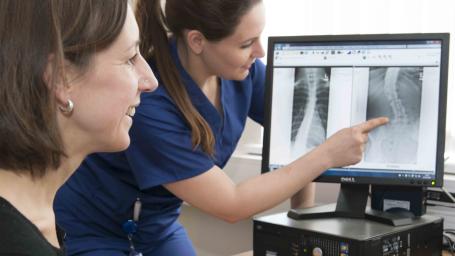Adult Clinics
We run regular clinics on Tuesday mornings, Thursday afternoons, and Friday all day for adults aged >16 years old. Also twice monthly anaesthetic/drug allergy specialist clinic on Friday mornings.
The clinics are located at Level 1 Gate 36 Brunel, Southmead Hospital.
Clinics cover both Allergy and Immunology referrals.
Day-cases
- Allergy desensitization/Omalizumab injections - mainly based at Level 1, Gate 36 alongside the Tuesday/Thursday/Friday clinics.
- Immunology Day cases e.g. Immunoglobulin infusions – in the shared / hospital day-case unit Level 1 at Gate 5 or at Level 1 Gate 36.
Food/Other Challenges
- Pre-arranged challenges are performed in the shared/hospital day-case unit Level 1 Gate 5 or at Level 1 Gate 36.
New Referrals
- See here for Allergy and here for Immunology.
Training
The department trains junior doctors and nurses, and so patients should be prepared to be reviewed by doctors and nurses in training, with appropriate senior support.
Contact/Enquiries:
General public enquiries should be directed to your GP in the first instance.
- General enquiries - via secretaries on 0117 4143456
- Consultants - via secretaries on 0117 4143456 or via switchboard to individual mobiles if clinician specific advice is required - 9-5, no on-call service provided
- Nursing Team - via 01174143456 or 07525805208
N.B. Paediatric Allergy cases are generally seen at The Bristol Children's Hospital (Respiratory Medicine Department) - 0117 3428258
Additional Outreach Services:
1. Gloucester Royal Hospital
Adult Clinics: Regular clinics are run every Wednesday morning for adults aged >16 years old at the Edward Jenner Unit, Ground Floor, in Gloucestershire Royal Hospital, GL1 3NN.
Day-cases: Immunology Day cases (e.g. Immunoglobulin infusions) are performed in the Haematology Day Care Unit, Ground Floor, Gloucestershire Royal Hospital, GL1 3NN
Food/Other Challenges: Pre-arranged via North Bristol NHS Trust
New Referrals: Only for Immunology cases. All allergy is managed via Southmead. Please see Patient Referral Pathways via North Bristol NHS Trust
Contact/Enquiries: To contact the service please call 0300 422 5213, 0300 422 4057 or via North Bristol Trust Immunology Secretaries or Immunology Nursing Team – see Allergy and Immunology Clinical Staff Contact Details.
2. Cheltenham General Hospital
Adult Clinics: Regular allergy clinics are run on the morning of the 2nd and 4th Wednesday of the month for adults aged >16 years old at the West Block Outpatients, Cheltenham General Hospital, GL53 7AN
Food/Other Challenges: Pre-arranged via North Bristol NHS Trust
New Referrals: Please see Patient Referral Pathways
Contact/Enquiries: via North Bristol Trust Immunology Secretaries or Immunology Nursing Team – see Allergy and Immunology Clinical Staff Contact Details.
3. Musgrove Park Hospital
Adult Clinics: We run regular clinics for adults aged >16 years old on the morning of the 1st Wednesday of the month at Musgrove Park Hospital, TA1 5DA.
Day-cases: Immunology Day cases (e.g., Immunoglobulin infusions) are performed in the shared hospital day-case unit in the Beacon Day Centre. Additionally, immunoglobulin infusions are given locally, near patients via the “Chemo bus” facility.
Food/Other Challenges: Pre-arranged via North Bristol NHS Trust.
New Referrals: Please see Patient Referral Pathways.
Research: The department is research active and so patients may be asked if they would like to be involved in research projects – via North Bristol NHS Trust.
Contact/Enquiries: via North Bristol Trust Immunology Secretaries or Immunology Nursing Team – see Allergy and Immunology Clinical Staff Contact Details.
4. Bridgwater Community Hospital
Adult Clinics: We run regular allergy clinics for adults aged >16 years old on the morning of the 3rd Wednesday of the month at Bridgwater Community Hospital, TA6 4GU.
Food/Other Challenges: Pre-arranged via North Bristol NHS Trust.
New Referrals: Please see Patient Referral Pathways.
Contact/Enquiries: via North Bristol Trust Immunology Secretaries or Immunology Nursing Team – see Allergy and Immunology Clinical Staff Contact Details.
5. Royal United Hospital in Bath
Adult Clinics: We run a monthly follow up clinic for RUH area adult patients with confirmed immune deficiency.
Day-cases: Patients on intravenous immunoglobulin replacement therapy are managed by Brownsword Biologics Unit, on site at the RUH.
New Referrals: The clinic only sees follow up Immunology patient, new patients will be accepted once seen at North Bristol NHS Trust depending on clinic capacity. Please see Patient Referral Pathways via North Bristol NHS Trust.
Contact/Enquiries: Via North Bristol Trust Immunology Secretaries or Immunology Nursing Team – see Allergy and Immunology Clinical Staff Contact Details.
Related Information
Immunology Laboratory
Information for GPs
Last updated: 20.02.23

